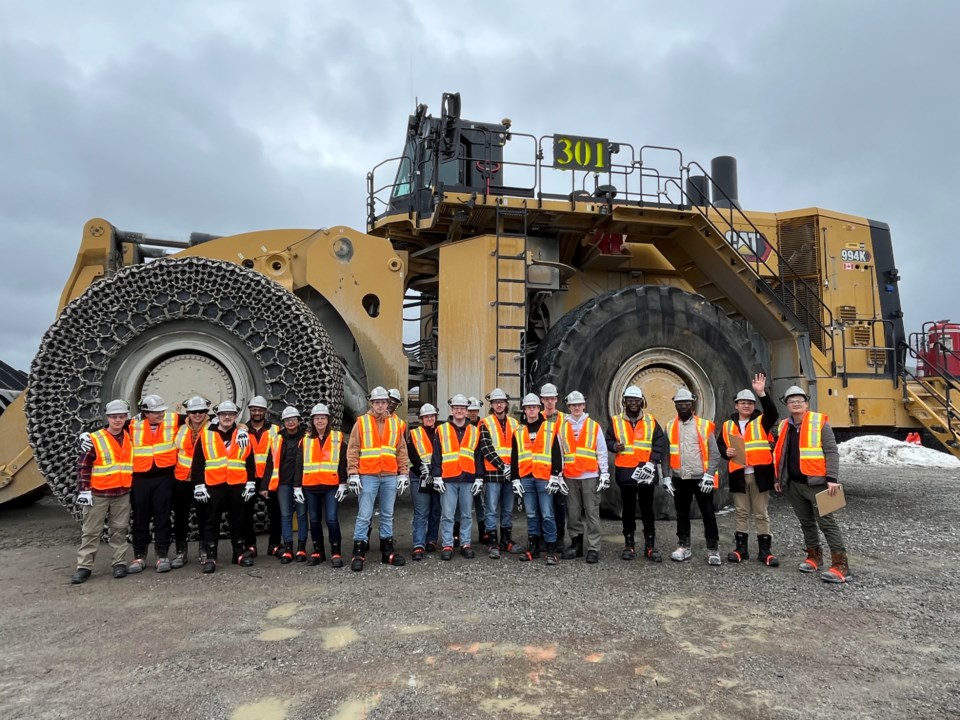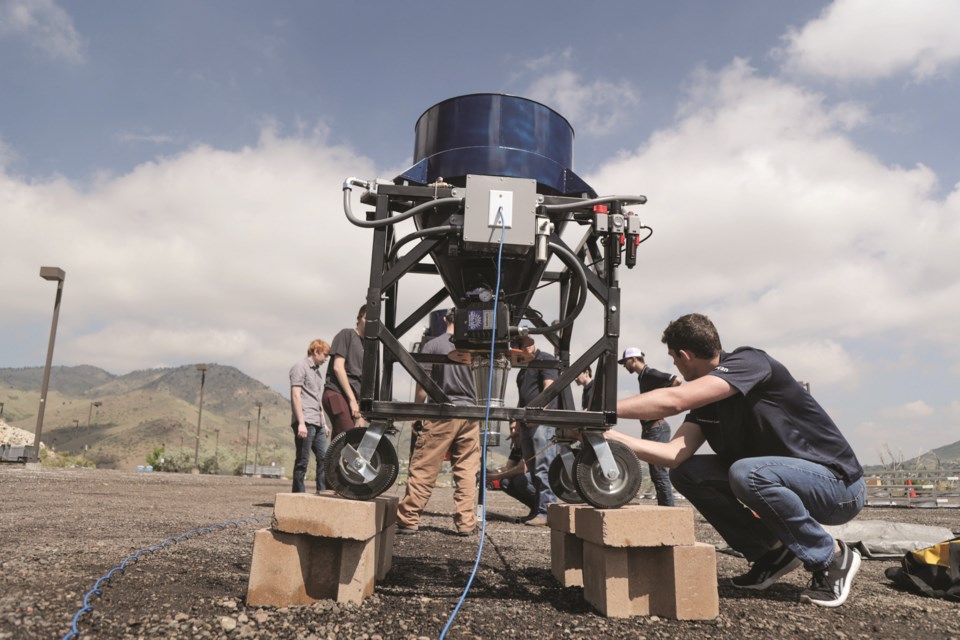The School of Engineering at Laurentian University is a hub for aspiring engineers and a launchpad for future changemakers. The School’s programs in Chemical, Mechanical, and Mining Engineering are finely turned to address the needs of modern society, while prioritizing sustainable practices. At the heart of the engineering programs is a commitment to producing professionals who are technically proficient and deeply aware of their environmental and societal responsibilities.
Experience & connections key to career success
Students often choose Laurentian because of the smaller class sizes, co-op placements, and connections to industry. Professor Brent Lievers says, “In the placement program, students work with an engineering employer for anywhere from 4 to 16 months, giving them a depth of experience that’s difficult to find in a summer job. They often work on a project from the design stage through to the implementation, allowing them to connect what they have learned with the real world.” The exposure to industry allows them to better contextualize concepts being taught in class.
Students get the opportunity to network and develop professional connections, with employers often viewing the experience as a chance to “test drive” future employees and possibly make them an employment offer.
LU Engineering students lead province in post-graduate employment
Last year, in a survey of LU’s Engineering students, more than 81% of respondents were working in their field 8 months after graduation, with 40% receiving a job offer before graduation, while another 40% were employed as they completed their program. The median salary was $75,000, while students who had completed a co-op placement earned $20,000 more than those who hadn’t.
Co-op placements aren’t limited to Northern Ontario. Past placements have taken students across the country and even to locations outside of Canada. All 4-year Engineering programs are fully accredited by the Canadian Engineering Accreditation Board.
Chemical Engineering Program
Laurentian University’s Chemical Engineering program equips graduates with the skills and knowledge to transform chemical processes into engines of economic growth and innovation while prioritizing sustainability. Dr Corey Laamanen, Coordinator of the Chemical Engineering program says, “This program goes beyond classroom theory to emphasize hands-on learning through Group Design Projects that challenge students to tackle problems and develop solutions to keep industries moving, innovating, and sustainable.”
The problems that students solve may come from faculty research, local industry, or issues that students have discovered during their co-op placements. Dr. Laamanen says, “This year, a student group is focusing on carbon capture at small wineries and breweries, and how we can capture a clean carbon source from fermentation and turn it into usable products.”
Within the Chemical Engineering program there are two specializations unique to Laurentian University. Dr. Laamanen says, “One of them is, looking at water and wastewater processes, pollution control and the environmental impact of industry and how we can solve many of those environmental problems, and the second area is extractive metallurgy, and how we produce metals once ore is out of the ground.” There is a constant drive to make things more sustainable and less environmentally harmful and how to optimize technologies to make them more efficient.
With their versatile skillset, Chemical Engineering graduates have their pick of career paths. They can work in mines, mills, consultancy firms, cosmetics and construction material manufacturing; every sector that makes something tangible. They turn raw materials into essential, everyday products, while driving innovation and sustainability. Dr. Laamanen adds, “I’m proud of the quality of graduates that we produce and that they meet the need of local business. Many of our graduates remain living and working in Sudbury and are contributing meaningfully to the Northern Ontario economy.”
Mechanical Engineering Program
From robots to high-speed trains, mechanical engineers design new products and processes to meet society’s needs. The Mechanical Engineering program offers two options, the general and mechatronics options. Professor Junfeng Zhang says, “What makes the Mechanical Engineering program truly dynamic is its focus on real-world applications. Students are solving practical problems that matter to the community.” They work in the areas of equipment and machinery, heating and ventilation, biomechanics and much more. Students might be working on sustainable HVAC systems that tackle Northern Ontario’s frigid winters, to make homes and businesses more energy efficient.
The Engineering program’s Capstone Projects prepare students for the real world.
Professor Markus Timusk says, “Our students partner with industry to solve practical problems. Recently, a team collaborated with a barbecue manufacturer to design a new open-flame grill line, contributing ideas that helped shape a commercial product. This year, one group is designing a robotic system to safely and efficiently demolish large smokestacks, which is a difficult problem that requires solid engineering as well as creativity.”
In the Capstone Projects students are working on solutions to challenges tied to industry needs. Their skills are demonstrated in how well they perform in national and international competitions. Professor Markus Timusk says, “A standout performance is the Over the Dusty Moon competition, organized by a U.S. university in collaboration with Lockheed Martin and NASA. The challenge was to design a device to efficiently and reliably transport lunar regolith or “moon dirt” for mining operations on the moon. Our mechanical and mechatronics engineering students ended up taking first place and outperforming teams from universities from around the world.”
Many mechanical engineering graduates are working in the mining, aerospace, and automotive industries. They have a wonderful reputation with employers and with their passion for problem-solving, they’re not just building machines, they’re building a brighter future in Northern Ontario.
Mining Engineering
Laurentian University’s Mining Engineering students have a unique opportunity to learn in the heart of one of the most mineral-rich regions in the world. Equipped to tackle some of its toughest challenges, these engineering graduates are shaping the future of the mining industry. Mining Engineering Professor Eugene Ben-Awuah says, “One of our program’s primary strengths is that the faculty in the Mining program have worked in the industry and they have extensive experience, both in teaching and in the field.”
Field trips to both underground and surface mining operations offer a hands-on experiential learning experience which allows students to visualize and understand the material being taught in the classroom. The insights and connections they gain, helps set them up in a career in mining that’s grounded in experience.
Mining engineering students master the art of solving real-world problems with funded public and private sector research projects initiated and guided by their professors. Professor Ben-Awuah says, “My specialization is in mine waste management and simulation of mining systems. I evaluate how mine planning can be improved and integrated with waste management to reduce environmental impacts. I also build models to simulate the mining operation digitally so that we can address any problems that may arise when mining is taking place.
Other projects the students are working on include ventilation and mine energy management, rock mechanics, and materials handling to protect the environment and the health and safety of the miners. Students help design improved ventilation systems to ensure miners have clean air. They explore cutting-edge mine energy management solutions to reduce costs and carbon footprints. Professor Ben-Awuah is also looking at the management of mineralized waste as a future resource; specifically, how low-grade material can be stockpiled and processed in the future with the right technology and economic conditions.
Being the only Mining Engineering program of its kind in Ontario, students strike it rich at Laurentian with an education at the epicentre of the global mining industry.

Path to a better and brighter future
Laurentian’s Engineering graduates are prepared to meet the demands of today and solve the problems of tomorrow. In a world driven by technological advancements and environmental challenges, Laurentian’s Engineering Program graduates are proving that innovation and sustainability can go hand in hand.
Sudbury and Northern Ontario are reaping the rewards. Laurentian’s Engineering programs are driving the region’s economy and positioning Canada as a global leader in sustainable engineering solutions which is win for both society and the planet.
Discover the educational opportunities and career possibilities at Laurentian University’s School of Engineering.
